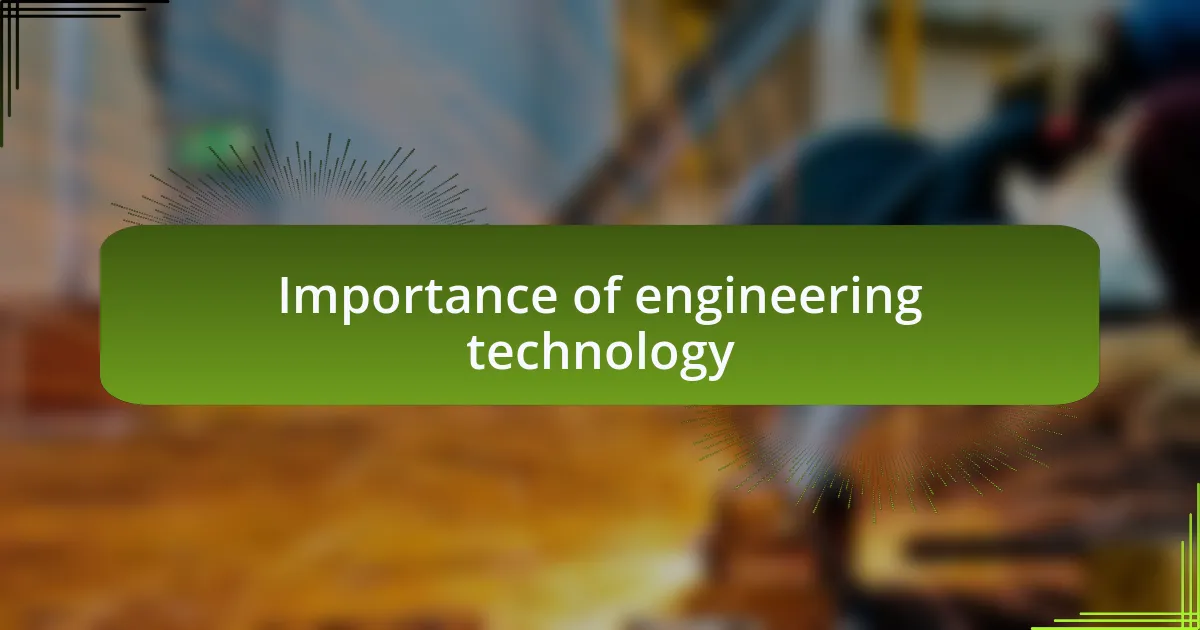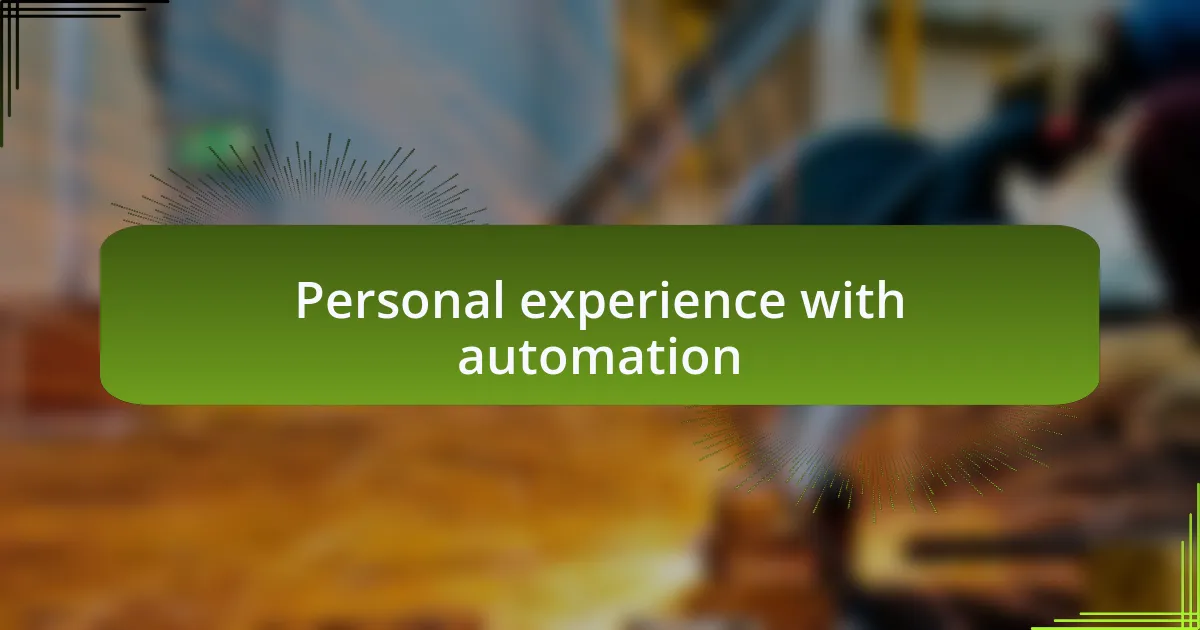Key takeaways:
- Automation in engineering enhances efficiency and fosters creativity, allowing teams to focus on innovative design rather than tedious tasks.
- Engineering technology improves safety by identifying potential weaknesses in projects that could be overlooked by human analysis.
- Automation streamlines workflows, significantly reducing time spent on tasks like scheduling and inventory tracking while enhancing team communication and collaboration.
- Personal experiences with automation show its positive emotional impact on work morale, empowering employees and reducing stress.

Understanding automation in engineering
Automation in engineering is a game-changer that reshapes how we approach tasks and projects. I remember the first time I saw an automated robotic arm in action—it was mesmerizing to witness how it effortlessly performed tasks that once required significant human effort. Have you ever thought about how much time we could save if we embraced technology more fully?
As I delved deeper into automation, I noticed it didn’t just enhance efficiency; it sparked a newfound creativity within our teams. For instance, I recall a project where automation allowed my colleagues to focus on innovative design rather than mundane assembly tasks. Wouldn’t you agree that freeing up our mental bandwidth enables us to tackle more complex problems?
The emotional impact of automation is profound. I felt a surge of excitement during discussions about streamlining processes, but I also encountered anxiety from some who feared job displacement. Isn’t it fascinating how technology can elicit both hope and apprehension? Balancing these emotions is crucial as we adapt and evolve alongside automation in engineering.

Importance of engineering technology
Engineering technology plays a critical role in shaping the modern industrial landscape. I distinctly remember the first time I implemented a new software for project management. It was astonishing how it automated scheduling and resource allocation, ensuring we met deadlines without the frantic last-minute rush that had once plagued our projects. Have you experienced that relief when technology takes over tedious tasks?
Moreover, the importance of engineering technology extends beyond mere efficiency; it drives safety advancements too. I recall a project involving structural analysis where automation tools identified potential weaknesses that human analysis could easily overlook. Isn’t it reassuring to think that these technologies help us construct safer buildings and infrastructure, ultimately saving lives?
On a broader scale, the integration of engineering technology fosters collaboration and innovation. I often find myself amazed at how my team can now work remotely on designs simultaneously thanks to cloud-based platforms. Can you imagine how much creativity could flourish when engineers across the globe collaborate instantaneously? It’s thrilling to reflect on how this connectivity can lead to groundbreaking inventions and solutions.

Overview of automation impacts
Automation has profoundly reshaped my work environment. I vividly remember when we integrated robotic process automation into our manufacturing line. The initial amazement quickly turned into appreciation as these robots took over monotonous tasks, boosting our production capacity while allowing us to focus on more strategic aspects of our projects. Have you ever marveled at how freeing it feels to let go of repetitive work?
Another significant impact of automation I’ve seen is in data management. Once, I spent hours sifting through data manually, which was not only exhausting but also prone to errors. After adopting automated data analytics tools, this entire process transformed. Now, I can generate reports in minutes with remarkable accuracy. Isn’t it fascinating how the right technology can turn tedious tasks into swift, precise actions?
Moreover, the shift towards automation refined our training procedures. I once witnessed a new employee struggle with outdated manual tasks, which made onboarding a lengthy affair. With the advent of simulation-based training software, the learning curve became much gentler and more engaging. I believe automation not only enhances productivity but also enriches the overall employee experience. How often do we consider the human side of technology? It’s exhilarating to witness this evolution firsthand, as it illustrates that technology can empower rather than replace us.

How automation increases efficiency
Automation significantly boosts efficiency by streamlining workflows that were once time-consuming. I recall when we implemented automated scheduling systems in our project management, replacing manual coordination. The difference was astonishing; tasks that used to take days to organize now take just moments, freeing up valuable hours for innovation and creativity.
My experience with automated inventory tracking further illustrates this point. It used to be a chore to check stock levels and reorder supplies, often leading to delays. Now, with real-time data updates and automatic reordering, the system ensures we never run low on essential materials. Have you ever felt the relief of knowing that a vital component is always available without the hassle? That’s the beauty of automation—it anticipates needs before they become problems.
Additionally, I’ve seen how automation enhances communication within teams. Previously, I would spend considerable time following up on emails to clarify tasks. Now, with automated progress tracking and notifications, everyone is on the same page, which has made collaboration smoother and more effective. Isn’t it amazing how technology can transform communication dynamics? This shift not only optimizes our processes but also fosters a more cohesive work environment where everyone can contribute more meaningfully.

Personal experience with automation
Personal experience with automation
When I first used a robotic process automation (RPA) tool to handle repetitive data entry tasks, it felt like a breath of fresh air. I was amazed by how much time it freed up for me to tackle more complex projects that actually required my expertise. Have you ever been caught up in monotonous work when you could be using your skills to innovate? I certainly have, and that moment of realization was a turning point in my career.
One memorable instance occurred during a project where we integrated automated feedback systems into our design processes. Instead of waiting weeks for client reviews, we received instant insights that helped us pivot our designs almost in real-time. The thrill of receiving immediate feedback was exhilarating. It brought a newfound energy to our team, sparking discussions that ultimately led to better solutions. Isn’t it incredible how the right tools can catalyze creativity?
Reflecting on these automation experiences, I often think about the emotional impact on work morale. The sense of empowerment that comes from automating mundane tasks can’t be overstated. I’ve witnessed firsthand how my colleagues’ stress levels decreased significantly as they embraced automation. They felt more inspired to tackle challenges head-on. Have you ever noticed how a little less stress can turn the atmosphere of a workplace into something vibrant and collaborative? That’s the magic of technology working in our favor.